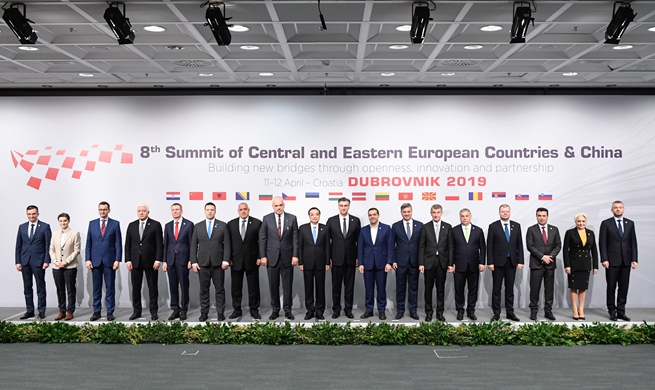SINGAPORE, April 13 (Xinhua) -- Singapore's Finance Minister Heng Swee Keat announced at the 11th Research, Innovation and Enterprise Council Meeting recently that the city-state will be investing more in research and development in digital technology and related areas.
Industry insiders in Singapore have realized for many years that the digital era will come and change the economy, government and society.
"Digital technology has become an integral part of our lives," the minister said in February when he delivered the Budget 2019 Statement.
To keep businesses growing and competitive, Singapore is leveraging digital technology in its economic transformation and building up its digital economy, in which China can help.
In fact, China, with its digital economy referred to as a leading global force by McKinsey Global Institute, has already been offering funds, talent, technology and experience to Singapore, as well as other Southeast Asian countries, for their digital economic development.
VISION
As early as the 1980s, Singapore began to focus on information and communication technologies and promote the transition of industrial sectors toward automation and digitalization. It implemented the National Computerization Plan from 1980 to 1985, which became a catalyst for the widespread acceptance of Information Technology (IT).
The plan incubated national IT capabilities which led to the growth of a budding local IT industry.
Since then, the Singaporean government has launched a number of projects such as the National IT Plan, IT2000, Infocomm 21, Connected Singapore, Intelligent National 2015 and Smart Nation initiatives, to transform Singapore into a hyper-networked, global hub for IT-based services.
At present, Singapore regards its digital economy as its future. It is building the digital economy together with digital governmental elements for a digitalized society, by pushing every industry, business and government agency to accelerate its digitalization efforts, so as to increase overall capabilities and solutions that will propel the nation forward.
TRANSFORMATION
According to Singapore's Smart Nation and Digital Government Office, going digital is a national imperative for a better future for Singaporeans, and digitalization is about enabling new possibilities across the economy, with business growth and better jobs.
"Our vision is to be a leading digital economy that continually reinvents itself in the fourth industrial revolution," said the office in its report.
"We do this via accelerating the digital transformation of existing economic sectors, fostering new ecosystems enabled by digital technologies, and developing a next-generation digital industry in sectors such as cybersecurity as an engine of growth."
The digital transformation of existing economic sectors is important for Singapore to expand its digital economy. The government rolled out 23 Industry Transformation Maps under the Committee of Future Economy in 2017 to digitalize its sectors and businesses, so as to raise their productivity and economic growth efficiencies.
The manufacturing sector accounts for nearly one-fifth of Singapore's gross domestic product (GDP). The Economic Development Board said the local manufacturing base has been gearing up to adopt the Industry 4.0 model, to enable the digitalization and automation of its processes, thus enhancing its efficiency and long-term competitiveness on the global stage.
As for the service sector, which accounts for about 72 percent of GDP, the Info-communications Media Development Authority (IMDA) has initiated a series of projects, such as GoCloud, PIXEL and Digital Services Laboratory, to support businesses' participation in the Services 4.0 ecosystem, in which Singapore is expected to deliver next-generation services that are end-to-end, frictionless, empathic, and anticipatory to customer needs.
PATHFINDER
Similar to Singapore, China attaches great importance to its digital economic development. Its notable achievements in multiple digital areas have led China to become a global leader in this area.
A report from the China Academy of Information and Communications Technology shows that its digital economy was estimated at 16 trillion yuan (about 2.32 trillion U.S. dollars) in the first half of 2018, equivalent to 38.2 percent of China's GDP.
China is willing to share the development opportunities in the digital economy with other countries.
While delivering a keynote speech at the opening ceremony of the first China International Import Expo last November, Chinese President Xi Jinping said, "In our inter-connected global village, to share the fruit of innovation is the common aspiration and natural choice of the world community."
He said, "We need to seize the opportunities presented by the new round of technological and industrial revolution, strengthen cooperation in frontier sectors such as digital economy, artificial intelligence and nanotechnology, and work together to foster new technologies, new industries, and new forms and models of business."
Thanks to China's opening-up, Chinese talent and enterprises have come to Singapore and are contributing to the country's and region's digital economic development by bringing in new business forms and models from China. They, including some famous Chinese Internet companies such as Alibaba, Tencent and Didi Chuxing, not only make digital services that are popular in China available in the region, but also help Southeast Asia to cultivate its own ecosystems for the digital economy.
ECOSYSTEM
A group of Filipino models set out to create a brand belonging to themselves two years ago, and they chose Southeast Asia's e-commerce giant Lazada Group, majority owned by Alibaba Group Holding Ltd., as their business partner.
Lazada carried out the market analysis for the models, and helped them determine their first product line would be lipstick. Based on the big data analysis conducted by Lazada, the models chose nine colors for their first batch of lipstick products, and these products sold out extremely fast in the Philippines.
Currently, the models are cooperating with Lazada to expand their business to the entire Southeast Asian market, and utilizing Lazada's online platform that has about 400,000 sellers and thousands of brands serving around 560 million consumers in the region.
Lazada's success lies in it continuously strengthening its capabilities in data analysis technology to logistics, from payment to its customer services chatbots. The Singapore-based company, which is funded, supported and powered by Alibaba, is cultivating an e-commerce ecosystem in Southeast Asia.
It logged business-to-consumer online retail sales of about 19 billion U.S. dollars in 2018 and will see the number jump to more than 53 billion U.S. dollars in 2023, according to Forrester Research.
Since being bought by Alibaba in 2016, Lazada has grown exponentially as a result of Alibaba's powerful influence. Lazada Group CEO Pierre Poignant said at a press conference last month that the advantages of Lazada include the highly-efficient logistics platform and the advanced technologies, which are both supported by Alibaba.
He added the third advantage of Lazada is that the company itself is backed by Alibaba. According to Poignant, he flies to east China's Hangzhou city every month to attend the management meetings of Alibaba, where he meets with leaders of various Alibaba units to discuss the strategy for Southeast Asian market.
Owing to the support of the Chinese company, Lazada is now a leading online retail platform in Southeast Asia in terms of customer traffic, trading volume and sales value. Last year, Lazada drew 1.3 billion customer visits to its platforms during the 11/11 and 12/12 shopping festivals.
In comparison to business success, however, Lazada pays more attention to the cultivation of the e-commerce ecosystem in Southeast Asia.
Poignant formally announced the vision for Lazada's future development, stating that the company will create 20 million jobs in the e-commerce ecosystem by 2030, as well as cultivate eight million successful and flourishing entrepreneurs and small- and medium-sized enterprises.













